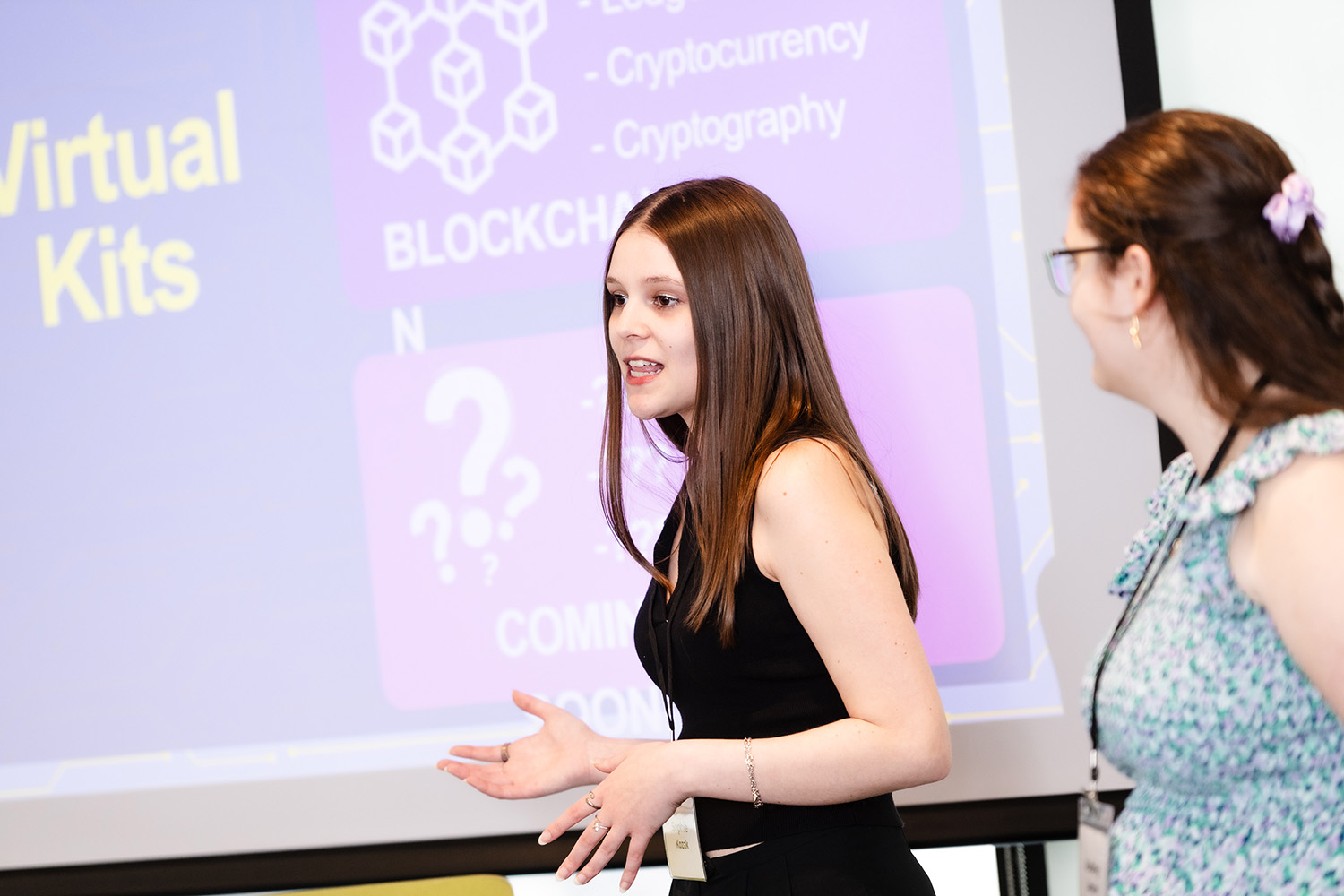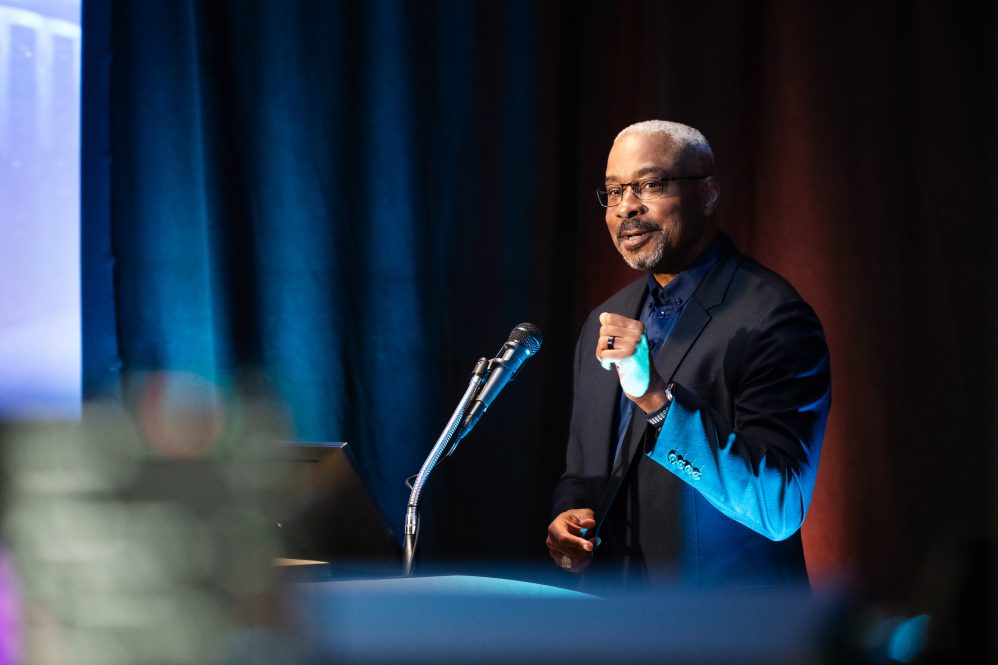A team of tech-savvy UConn undergraduates taught dozens of Greater Hartford business managers, executives, and fellow students how to identify a brain tumor on a CT scan in less than two minutes.
Using Google Teachable Machine, they demonstrated how artificial intelligence can be used to ‘train’ a program to differentiate between scans of healthy brains and those raising red flags. Within minutes, participants were able to analyze new, uncategorized brain images on their laptops.
The student demonstration was part of Hartford AI Day, an annual event that this year drew a record-setting 500 participants. The full-day seminar is designed to further promote Hartford as an AI Center of Excellence and to encourage the development of tech talent.
AI Day was sponsored by Launc[h], a coalition of Hartford’s innovation community. UConn was the lead educational sponsor and hosted the event at its graduate business campus on Constitution Plaza. Sponsors included Google, CGI, Otis, Travelers, Hartford Healthcare, Slalom, and Nassau.

‘We don’t want tech to be scary’
The brain-tumor project is one that was developed for students in UConn’s Allied Health program. It was presented by five emerging-tech enthusiasts. All of them are leaders in the School of Business’ Innovate Labs, an experiential learning hub that offers everything from robotics to drone demonstrations, 3D printing to virtual reality. The students’ goal was to spark interest and curiosity in those who might be reluctant to try AI.
“I enjoyed showing everyone how we get our students excited about emerging tech,’’ said junior Audrey Larson, a material science engineering major and Innovate Labs instructor. “We don’t want tech to be scary or overwhelming. We want people to try new technology.’’
Junior Sophie Kozak, a physics major and astrophysics minor, said she has used artificial intelligence to augment her research on black holes.
“It takes what you’ve done and gives you tips and tricks for doing it better,’’ she said. “AI is part of everyday life now.’’
AI Has Vastly Improved in Just Two Years
In a later presentation, School of Business professor Wei Chen, an AI expert, led a course on using AI for business intelligence. He discussed how Generative AI can accelerate business decision-making and reveal insights, often reducing research time from six months to a few days.
He shared several examples of how AI is shaping business, including an AI-generated graph showing the average vacation rental prices, each week, in a specific area; a program that allows a user to upload a menu and then AI identifies the restaurant that it came from; and the ability to pinpoint a cargo ship at sea and determine where it will dock.
Chen said UConn has graduate business students who are well-versed in AI and are eager to assist companies with their AI-development projects.
‘I’m excited about everything I see’
The AI Day keynote speaker was M.K. Palmore, a Google Cloud executive. Prior to joining Google Cloud, Palmore served for 32 years in the FBI, specializing in cybersecurity, crisis management, and counterterrorism.
“I’m excited about everything I see,’’ Palmore said. “Being at Google is like being on a rocket ride. You’re at the center of innovation.’’
He said machine learning will be integrated into almost everything that is brought to market and will play an equally big role in government and education. For instance, a chatbot at the DMV would allow customers to verify they have all the information they need to register a car before they speak with staff. In education, AI could offer customized tutoring or predictive analytics. He said the laborious FBI field office inspection reports that he used to compile, could be completed in minutes instead of months.
For cybersecurity, AI will help close the gap between the need for 1 million experts worldwide and the talent shortage. For example, it could assess whether a security breach is minor or significant. Cybercriminals are savvy, agile, persistent and capable, he said. “An attacker only needs to be right once, but a defender needs to be right every time,’’ he said.
Seeking Ways to Differentiate Ourselves
Meanwhile School of Business Interim Dean Greg Reilly said AI is impacting all businesses and is a source of growing interest for the School’s business undergraduates and graduate students. A proponent of artificial intelligence, he said the state and its businesses must keep up with technology to succeed.
“But if we are all using similar tools, we will also have to find ways to differentiate ourselves,’’ Reilly said, adding the conference is a chance to do that.
“We have a lot to offer in the talent-development space,’’ he told business leaders. “We want to be your partner in that endeavor.’’
Following Reilly, Connecticut Department of Economic & Community Development Commissioner Dan O’Keefe spoke about how Connecticut is poised to take advantage of AI. In recent years, the state has seen acceleration in jobs, economic growth, and a renewed interest in living here.
O’Keefe, whose background includes working for tech companies, said the state is embarking on a series of initiatives to propel Connecticut’s growth over the next 25 to 50 years.
Seeking New Ideas, Solutions
Alumnus David Gallo ’84 (CLAS) works for a global manufacturing company that has been experimenting with emerging technology. Gallo said he thinks there is a gap between high-tech ideas and practical implementation. He attended AI Day to expand his knowledge and identify opportunities that could benefit his employer.
“I liked the energy and ideas from the speakers,’’ he said. “They presented good recommendations about how AI is developing, how to move forward, and where to be more thoughtful.’’



